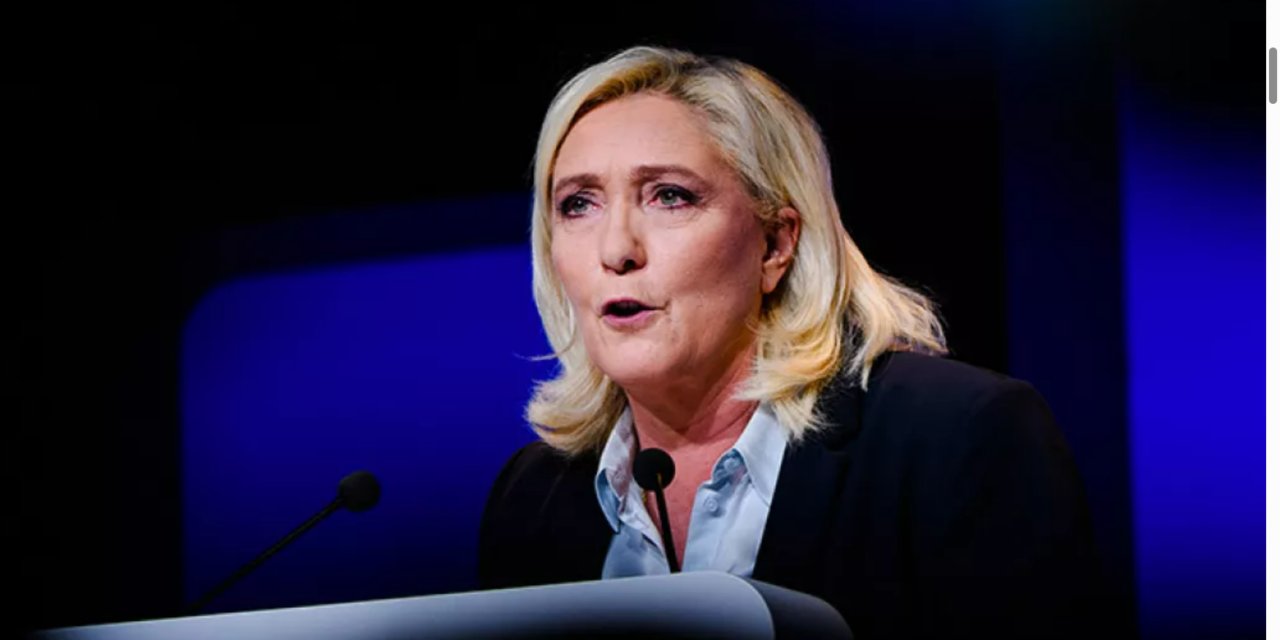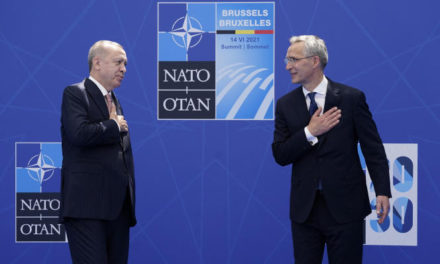The Assault on Populist Opposition in Europe
The conviction of Marine Le Pen on charges of embezzlement has sent shockwaves through the political landscape of France and the European Union. While mainstream media touts this as a victory for justice, a deeper analysis reveals a troubling pattern: the EU’s ruling elites are strategically eliminating populist opposition that threatens their hegemony. T
he accusations against Le Pen, ranging from misuse of parliamentary funds to over-invoicing, are not only highly subjective but also pale in comparison to the rampant corruption and financial abuses committed by other Members of the European Parliament (MEPs).
Unlike most mainstream media my article aims to meticulously break down the charges against Le Pen, highlight their dubious nature, and contrast her treatment with the unchecked abuses of EU bureaucrats. Furthermore, I wish to draw your attention to the parallels between Le Pen’s persecution and the political suppression of anti-EU figures such as George Simion in Romania, illustrating the European establishment’s desperate bid to silence dissenting voices.
The Charges Against Marine Le Pen: A Closer Look
The accusations that led to Le Pen’s guilty verdict centre around the alleged misuse of approximately €136,993.99 of EU funds during her tenure as a Member of the European Parliament (MEP) from 2004 to 2017. Let’s break down these charges and examine their credibility.
1. Parliamentary Assistant Salaries
One of the primary allegations against Le Pen is that she misallocated EU funds by employing individuals as parliamentary assistants who, in reality, were engaged in activities for her political party, the National Rally (formerly National Front), rather than performing duties related to the European Parliament.
Subjectivity of the Claim: The line between parliamentary duties and party activities is often blurred. In practice, parliamentary assistants often assist their MEPs with political, administrative, and legislative tasks, many of which are inseparable from party functions. If Le Pen’s assistants performed even partial parliamentary duties, then the claim that the funds were entirely misused is highly disputable. Many other MEPs employ assistants who engage in both party and parliamentary work without facing prosecution. The selective application of this rule raises questions about political bias in the enforcement of EU regulations.
2. Over-Invoicing and Fictitious Services
The prosecution argued that Le Pen over-invoiced expenses and claimed fictitious services. One specific instance involved a €5,000 expense for hotel rooms for 13 party members attending a conference titled “European Regions and the Financial Crisis.” However, the investigation alleged that the meeting primarily focused on National Rally activities rather than EU parliamentary work.
Subjectivity of the Claim: Political conferences often serve multiple functions, combining legislative discussions with party strategy. Many EU politicians have hosted or attended such events without repercussions. The assertion that the conference was purely for party activities is subjective and lacks definitive proof. The EU’s ruling elites appear to have applied a double standard to Le Pen.
3. Personal Expenditures and Website Development
Le Pen and her father, Jean-Marie Le Pen, were accused of claiming EU funds for the development of personal websites that were never actually built. Additionally, Jean-Marie Le Pen reportedly ordered 129 bottles of wine and champagne worth over €8,500, which were allegedly charged to the European Parliament.
Subjectivity of the Claim: If these expenses were fraudulent, they should be treated as administrative infractions rather than criminal acts warranting political exile. Moreover, the scale of the alleged misuse is minuscule compared to the financial mismanagement commonly seen within the European Parliament.
The Widespread Abuse of EU Funds by MEPs
If the European Union were genuinely concerned about financial integrity, it would apply its scrutiny across the board. However, numerous reports have exposed rampant financial abuses by other MEPs that have not resulted in criminal convictions. Here are some of the most egregious examples:
- MEPs Hiring Excessive Numbers of Assistants – In 2013, over 80 MEPs employed 10 or more local assistants, often during election periods. One MEP reportedly hired 43 assistants. These assistants were frequently used for campaign activities, an even more blatant abuse of funds than what Le Pen was accused of.
- Transfers of Salaries to Political Party Coffers – Investigations by the European Anti-Fraud Office (OLAF) have revealed that MEPs and their staff transferred portions of their salaries directly to national party accounts. Between 2014 and 2019, such contributions exceeded €1.18 million.
- Lavish Personal Expenditures – Many MEPs have used parliamentary funds for personal luxuries, including extravagant dinners, travel expenses, and entertainment. Unlike Le Pen, they have faced no legal consequences.
- Cases of Notable MEPs Involved in Financial Misconduct:
Jacques Barrot, a prominent French politician and member of the Union for a Popular Movement (UMP), was implicated in a significant political financing scandal in France. In 2000, while serving as the Secretary-General of the now-defunct Centre of Social Democrats (CDS), Barrot was convicted of embezzling approximately £2 million in government funds, which were illicitly redirected to finance his political party. The court sentenced him to an eight-month suspended prison term for this offense.
However, this conviction was nullified due to a presidential amnesty enacted in 1995 by then-President Jacques Chirac. The amnesty effectively erased certain convictions, including Barrot’s, from public record, leading to the automatic removal of his sentence.
The revelation of Barrot’s prior conviction surfaced in 2004 during his tenure as the European Commissioner for Transport. Nigel Farage, a Member of the European Parliament (MEP) from the UK Independence Party (UKIP), brought the matter to light, questioning Barrot’s integrity and suitability for the role. In response, Barrot asserted that he had no obligation to disclose the conviction, as it had been legally expunged under French law. European Commission President José Manuel Barroso expressed full support for Barrot, stating that the explanations provided were satisfactory.
This incident underscores the complexities and controversies surrounding political accountability and the implications of legal amnesties within the European political landscape.
José Manuel Barroso, former President of the European Commission, has faced scrutiny over two notable incidents:
- 2005 Yacht Holiday with Spiros Latsis:
- Allegation: In 2005, reports emerged that Barroso had spent a week on the yacht of Greek billionaire Spiros Latsis. Shortly thereafter, the European Commission approved €10 million in state aid for Latsis’s shipping company, raising concerns about a potential conflict of interest.
- Response: Barroso dismissed the allegations as “absurd,” asserting that the trip was a personal holiday with a longtime friend and that the aid decision had been made by the previous Commission before he took office. A censure motion in the European Parliament was overwhelmingly defeated, with 589 votes against, 35 in favour, and 35 abstentions.
- 2016 Goldman Sachs Appointment:
- Allegation: In 2016, Barroso accepted the role of non-executive chairman and adviser at Goldman Sachs International, shortly after the mandatory 18-month “cooling-off” period post-presidency. Given the bank’s involvement in the 2008 financial crisis and its role in masking Greece’s debt levels, this move sparked criticism and led to an ethics investigation by the European Commission.
- Investigation Outcome: The EU’s Ad Hoc Ethical Committee concluded that there were insufficient grounds to establish a violation of integrity and discretion duties. However, it noted that Barroso “had not shown the considerate judgment one may expect from someone having held the high office he occupied for so many years.”
Martine Aubry (France) – Allegedly misused public funds for personal expenses and partisan activities.
Nigel Farage (UK) – Was investigated for misusing EU funds to finance UKIP’s campaign-related activities.
Cecilia Malmström (Sweden) – Accused of extravagant travel expenses while serving as European Commissioner.
Elmar Brok (Germany) – Charged journalists for access to the European Parliament and faced allegations of financial misconduct.
It is clear that the selective prosecution of Marine Le Pen suggests that her conviction is politically motivated, serving as a tool to eliminate a formidable challenger to the EU’s ruling establishment.
The Broader Political Agenda: Neutralizing Populist Opposition
Marine Le Pen has long been a thorn in the side of the EU elites. Her opposition to the bloc’s undemocratic policies, her calls to restore national sovereignty, and most recently, her strong stance against continued EU involvement in the Ukraine war, have made her an existential threat to Brussels’ power structure.
Le Pen’s Opposition to the Ukraine War
Unlike French President Emmanuel Macron and other EU leaders, Le Pen has voiced her opposition to the European Union’s aggressive stance on Russia. She has advocated for restoring diplomatic ties with Moscow, recognizing that prolonging the conflict only serves the interests of NATO and American hegemony. This position is anathema to the EU’s elite, who are invested in maintaining a confrontational stance against Russia.
Parallels with George Simion in Romania
Le Pen is not the only victim of the EU’s purge of anti-establishment politicians. George Simion, the leader of Romania’s Alliance for the Union of Romanians (AUR), has also faced relentless attacks from Brussels. Simion has been a vocal critic of EU overreach, excessive bureaucracy, and the economic exploitation of Eastern European nations by Western European elites. Just as Le Pen was gaining traction in France, Simion was poised to lead Romania, only to face increasing political and legal attacks designed to derail his rise.
Conclusion: A Rigged System
Marine Le Pen’s conviction is not about financial wrongdoing; it is about political suppression. The EU’s ruling class, fearing her ascent to the presidency in 2027, has used the judiciary as a weapon to eliminate her from the race. The subjective nature of the charges, the widespread yet unpunished abuses by other MEPs, and the timing of her conviction all point to a coordinated effort to crush populist opposition.
If European democracy is to mean anything, it must uphold equal treatment under the law. The EU’s targeted persecution of anti-establishment leaders like Marine Le Pen and George Simion exposes the fragility of the so-called “democracy” the bloc claims to champion. European citizens must recognize this manipulation for what it is: an attempt to silence those who challenge the status quo and fight for national sovereignty.
The battle for France, and indeed for Europe, is far from over. The question remains: will the people allow the EU’s elites to dictate their political choices, or will they fight back against this blatant abuse of power?





